Key takeaways
- Digital literacy in education emphasizes critical evaluation of information and effective online communication, transforming how students engage with learning materials.
- Khan Academy facilitates personalized learning through structured yet flexible content, enabling students to revisit complex ideas and enhancing their understanding of philosophy.
- Engaging with digital tools for philosophy encourages active participation and exploration, although navigating overwhelming resources can be challenging.
- Effective online philosophy study involves setting clear goals, creating a distraction-free environment, and actively engaging with content through questioning and discussion.
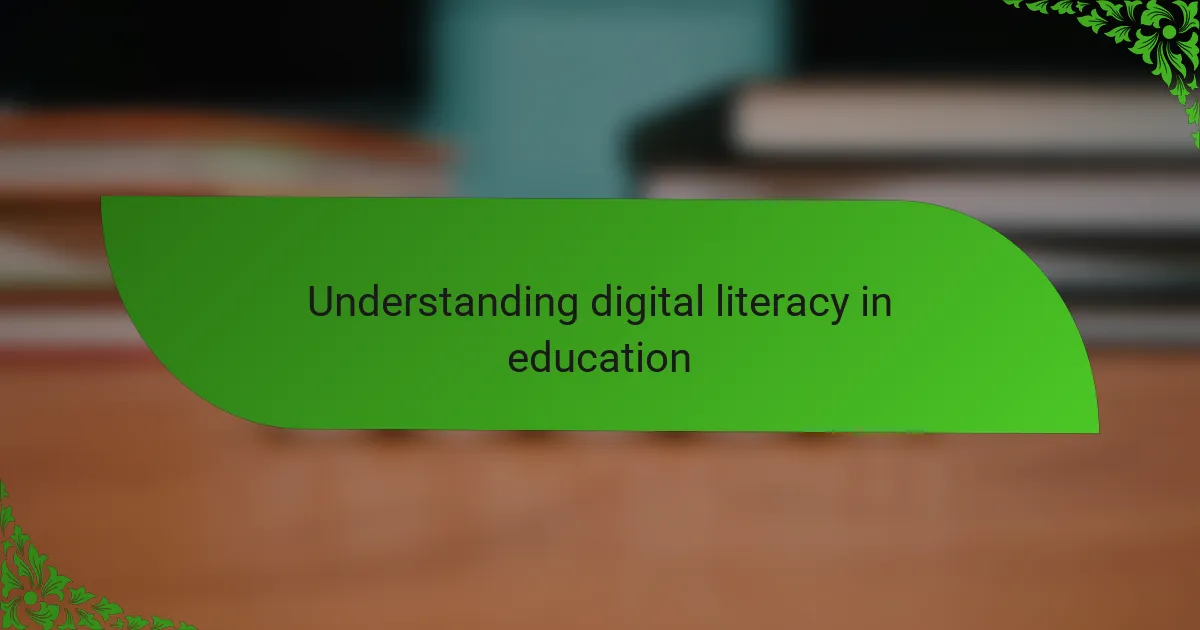
Understanding digital literacy in education
Digital literacy in education goes far beyond just knowing how to use a computer or navigate the internet. From my experience, it’s about critically evaluating information, understanding digital tools, and communicating effectively in an online environment. Have you ever paused to wonder how the sheer volume of information available digitally can shape our thinking, especially in a philosophy classroom?
When I first encountered digital literacy in my own learning, I realized it wasn’t just a technical skill but a mindset shift. It required me to question not only the sources I trusted but also how digital platforms influenced the way I absorbed knowledge. This deeper level of engagement changed how I approached complex philosophical concepts, making me more reflective and analytical.
What struck me most was the emotional aspect of digital literacy—how frustrating or empowering it can feel to either struggle with or master these skills. It’s not just about efficiency; it’s about gaining confidence to participate in a global conversation, which is crucial in philosophy education where ideas demand exploration from many angles. Does that resonate with you? I’ve found that this kind of literacy opens doors to richer, more nuanced discussions.
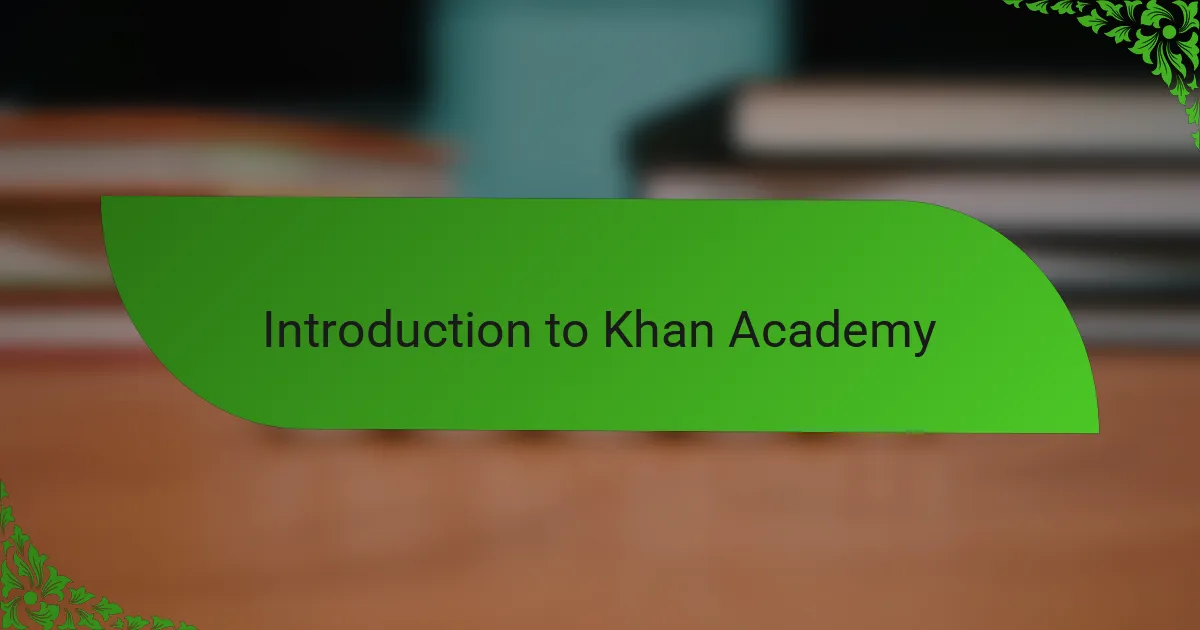
Introduction to Khan Academy
Khan Academy first caught my attention as a vast digital library, brimming with free lessons on everything from math to art history. I remember feeling a mix of curiosity and skepticism—could one platform really offer quality education that matched traditional classrooms? As I explored further, I discovered its unique approach: clear, bite-sized videos paired with interactive exercises that let me learn at my own pace.
What surprised me most was how Khan Academy invited me into a space where learning felt both structured and flexible. Have you ever enjoyed revisiting a challenging idea repeatedly until it finally clicks? That’s exactly what this platform encouraged—it respected my need to pause, rewind, and try again without pressure. This personalized rhythm made digital learning less daunting and, in some ways, even empowering.
From my experience, Khan Academy isn’t just a tool; it’s a guide that fosters curiosity and resilience. Its design reflects an understanding that learning isn’t linear, especially when tackling big questions or new skills. Does that resonate with your view of effective education? For me, it transformed digital literacy from a mere necessity into an engaging journey.
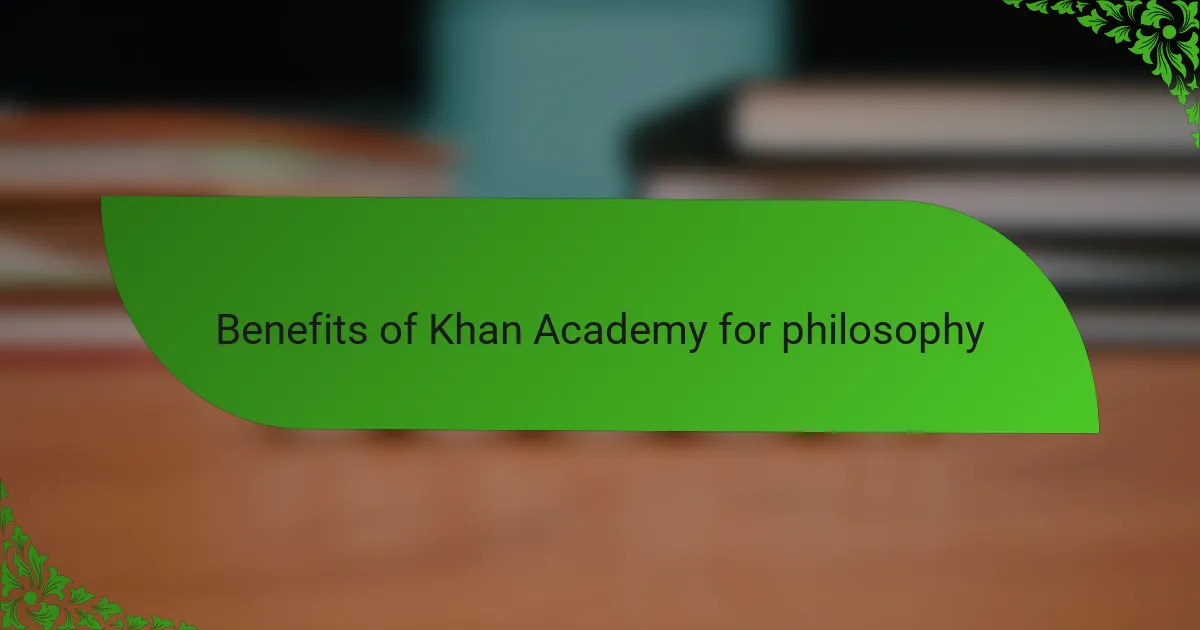
Benefits of Khan Academy for philosophy
What really stood out to me about Khan Academy’s benefit for philosophy was its ability to break down abstract ideas into manageable, clear explanations. Have you ever felt overwhelmed by dense philosophical texts that seem almost impenetrable? Khan Academy’s concise videos helped me untangle complex theories and made them feel accessible, which was a game changer for my confidence.
Another plus I found was the platform’s interactive exercises that encouraged me to apply what I learned immediately. In philosophy, understanding isn’t just about memorizing concepts—it’s about wrestling with arguments and refining your reasoning. Khan Academy gave me that chance to engage actively, reinforcing my critical thinking skills in a way that felt both challenging and supportive.
I also appreciated how Khan Academy connected philosophy to other subjects, showing me its relevance beyond just theory. For instance, when I saw ethical questions linked to history or science, it sparked fresh curiosity and a deeper appreciation for philosophy’s role in everyday life. Didn’t that kind of real-world connection make learning feel more meaningful to you as well?
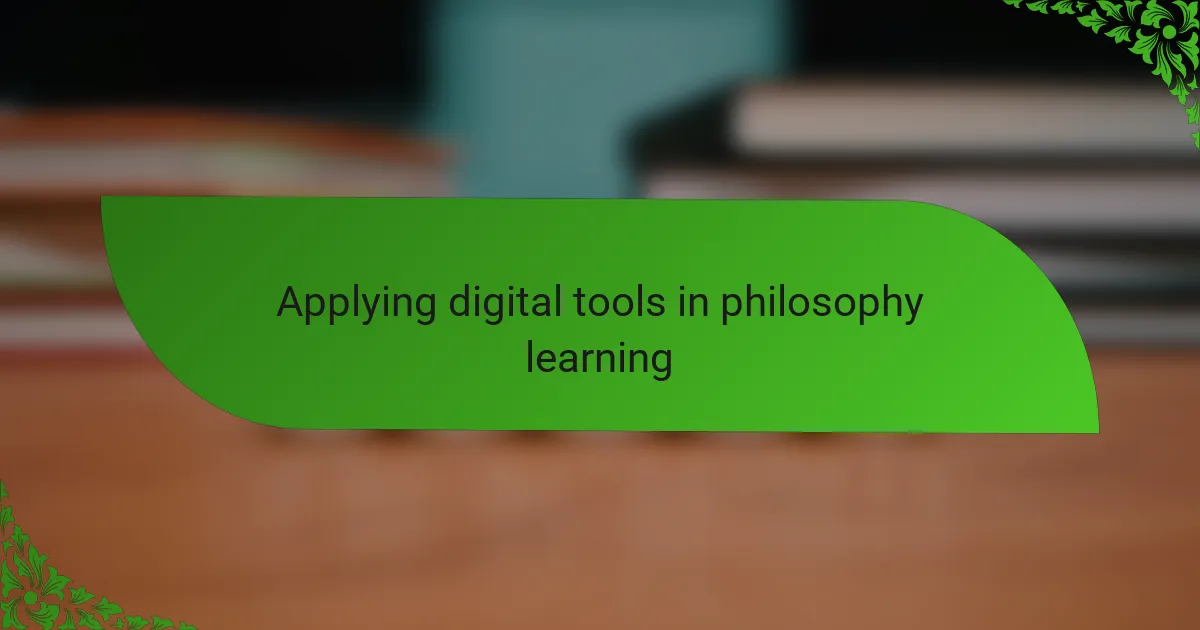
Applying digital tools in philosophy learning
Using digital tools to learn philosophy has completely changed my approach to the subject. Instead of passively reading dense texts, I found myself actively engaging through online platforms that offered multimedia content and interactive discussions. Have you ever noticed how a well-timed video or an insightful forum comment can open your mind in ways a textbook never did?
One thing I realized is that these tools don’t just deliver information—they invite exploration. For example, when I encountered a tricky philosophical argument online, I could pause, rewind, and even debate it with others in real time. This flexibility made philosophy feel less like an academic hurdle and more like an ongoing conversation.
Yet, it’s not always smooth sailing. Sometimes the sheer number of digital resources can feel overwhelming, making it hard to decide where to focus. But from my experience, learning to navigate these digital spaces thoughtfully is part of developing philosophical thinking itself—questioning not only the content but also the medium delivering it. Doesn’t that challenge feel surprisingly aligned with what philosophy asks of us?
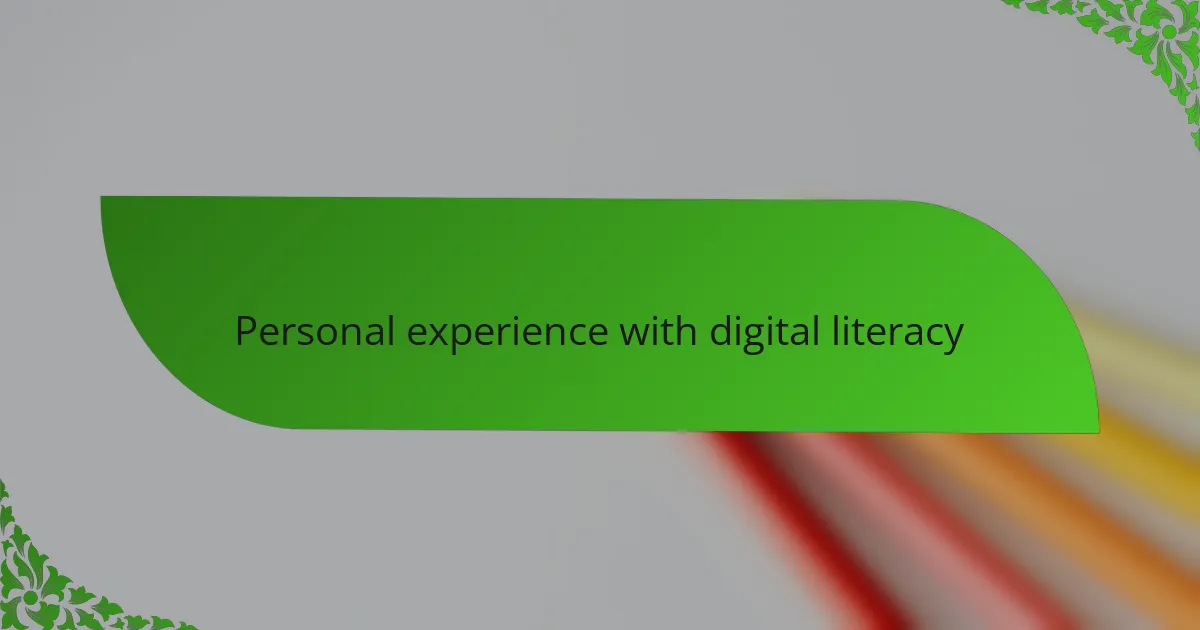
Personal experience with digital literacy
When I first tried to improve my digital literacy, I felt both excited and puzzled. I remember staying up late figuring out how to verify sources and not just skim headlines. Have you ever felt that mix of overwhelm and curiosity when stepping into a new digital world? For me, it was a turning point in how I approached learning and information.
There was also a moment when I realized digital literacy isn’t just about skills but attitude. I started questioning how algorithms shaped the information I saw and how that influenced my thinking. That awareness made me more cautious but also more empowered—it felt like gaining a new lens through which to see the digital landscape.
At times, I admit, frustration crept in. Navigating endless tabs and trying to balance skepticism with openness was exhausting. Yet, each small victory—like confidently discerning credible content or participating in online discussions—brought a sense of accomplishment that kept me motivated. Have you experienced that blend of struggle and triumph in your journey with digital literacy?
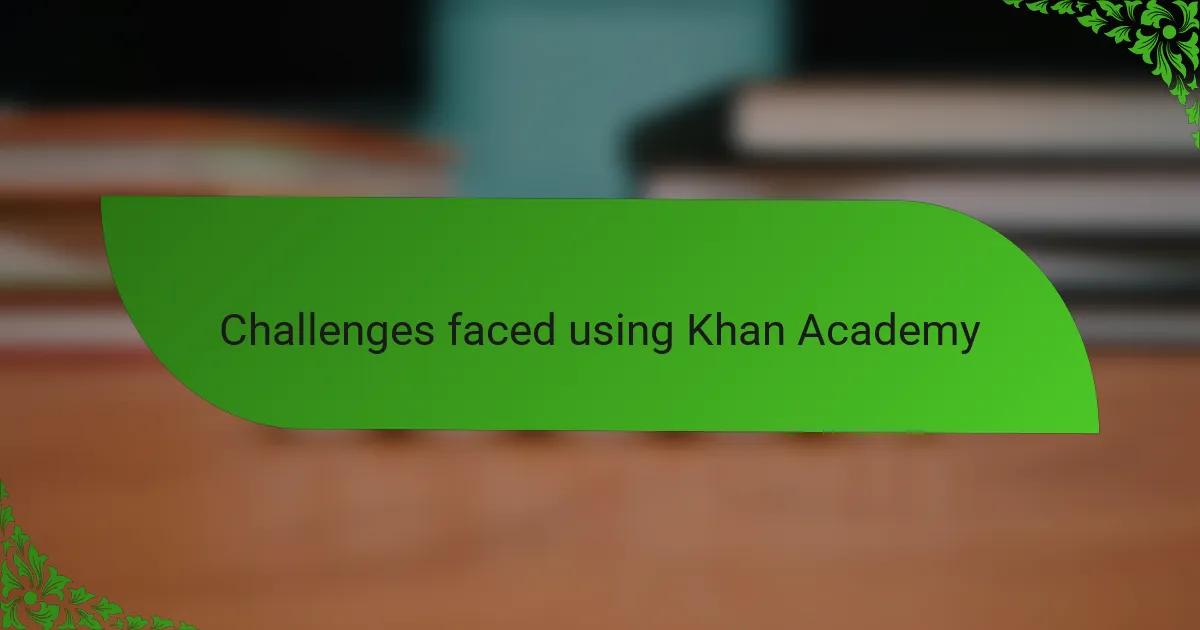
Challenges faced using Khan Academy
Using Khan Academy wasn’t without its bumps. I often found myself frustrated by the platform’s rigid structure when I wanted to dive deeper into philosophical debates; the lessons can sometimes feel too bite-sized or simplified for the nuance philosophy demands. Have you ever wished for more open-ended discussions rather than neatly packaged answers? That was definitely a challenge for me.
Another hurdle came from balancing self-paced learning with motivation. Without a traditional classroom setting, I sometimes struggled to maintain focus, especially when the material felt abstract or disconnected from the bigger philosophical questions I cared about. It made me realize that digital literacy involves not just technical skills but also self-discipline and emotional resilience.
Finally, I noticed that the interactivity tools, while helpful, occasionally lacked the complexity needed for philosophical reasoning. The quizzes and exercises pushed for quick answers more than reflective thinking, which left me craving richer feedback. Does that tension between speed and depth in digital learning platforms ever resonate with you? For me, it highlighted the gap between technology and the contemplative nature of philosophy.
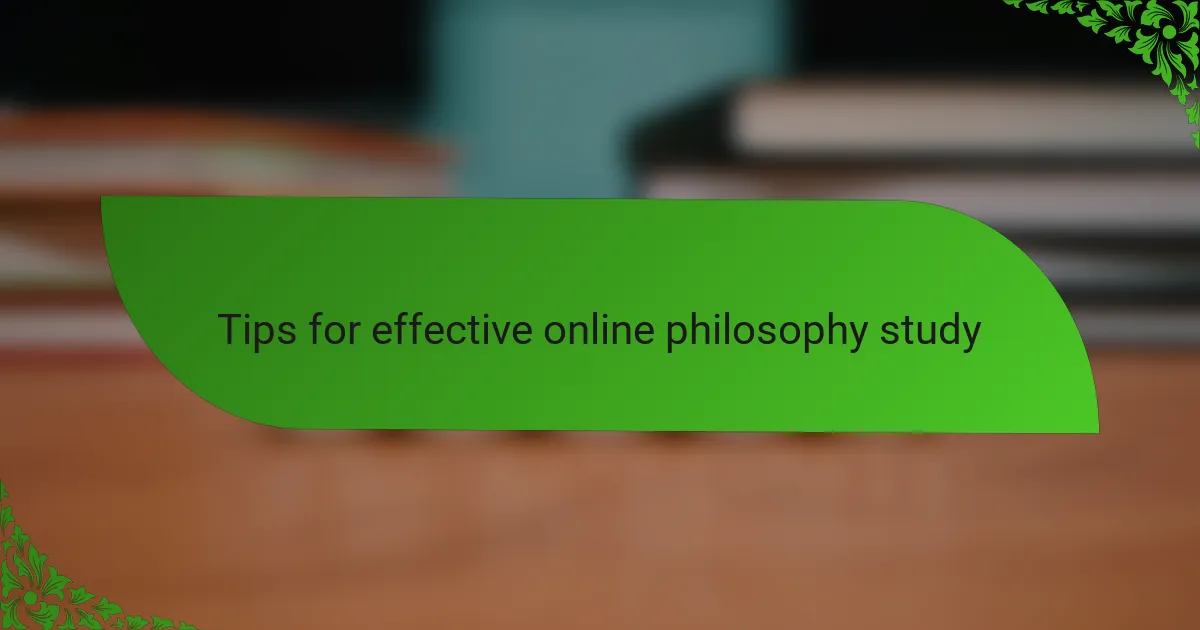
Tips for effective online philosophy study
One tip I’ve found indispensable is setting clear goals before each online session. Have you ever started a philosophy video only to realize fifteen minutes later you’ve wandered off into unrelated topics? I’ve been there, and having a focused question or idea to explore beforehand keeps me grounded and makes the study time genuinely productive.
Another thing that helped me was creating a distraction-free environment. It’s surprisingly easy to get pulled away by notifications or random tabs. Once, I tried watching a complex ethical theory lesson while half-distracted by emails—and honestly, it didn’t stick. Turning off distractions allowed me to fully immerse myself in the arguments and appreciate their depth.
Finally, I recommend engaging actively with the content rather than passively consuming it. I like pausing videos to jot down questions or challenge a point. Have you ever tried debating an idea aloud or discussing it with someone else? This method turns abstract theories into something real, and it made my online philosophy study much richer and more personal.